Two Docs get mixed-up; Steven and Dodo are master pianists; and the whole thing is tied together with the most annoying song in the Wild West.
The Doctor is turned invisible, inaudible and intangible, and Steve and Dodo clown around in this both childish and completely racist serial.
Podcast: Play in new window | Embed
As The Doctor, Steven and Dodo arrive… somewhere… Doc has been turned invisible and intangible. Then, shortly thereafter, he’s all fine again. It turns out they’ve been kidnapped by the Celestial Toymaker, one of the Guardians of Time (we don’t find that out yet) whose hobby it is to abduct people and make them play childish games, and then transform them into toys if they lose.
The troupe is split up, with Steve and Dodo having to play said games, pinned against such dastardly foes as harmless yet annoying clowns, harmless yet annoying playing cards, a harmless annoying cook, and so on. Meanwhile, The Doctor has to play a game of the Trilogic Game with/against the Toymaker. And Steve and Dodo can only find the TARDIS and leave by continually winning, and the Doctor can only find the TARDIS and leave by, well, that’s never quite established.
Whatever. That’s pretty much it.


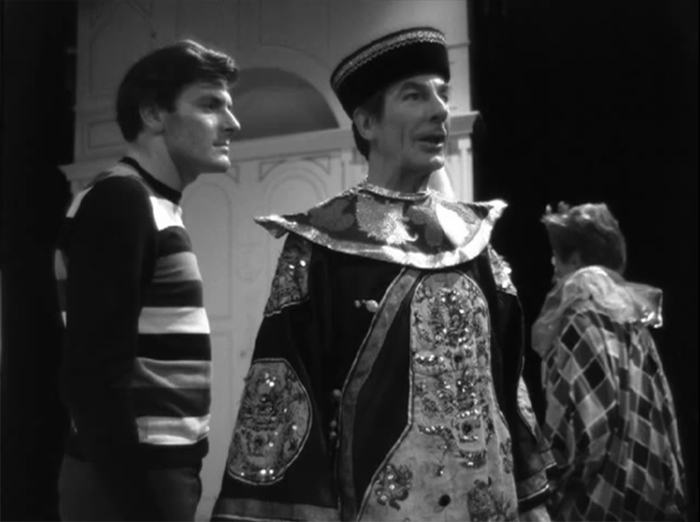

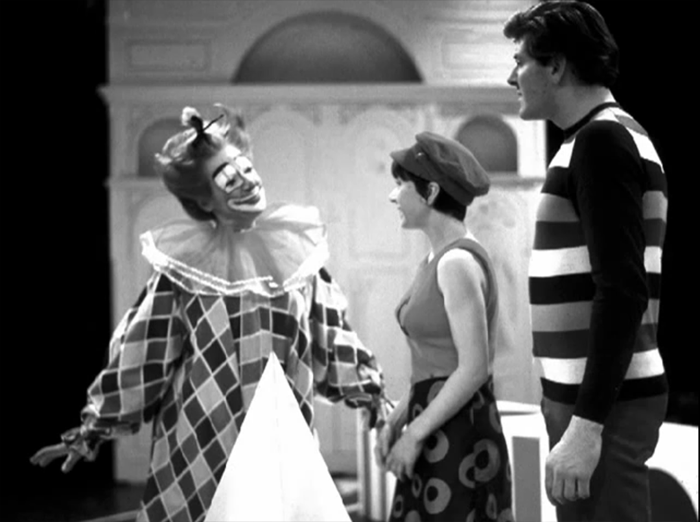

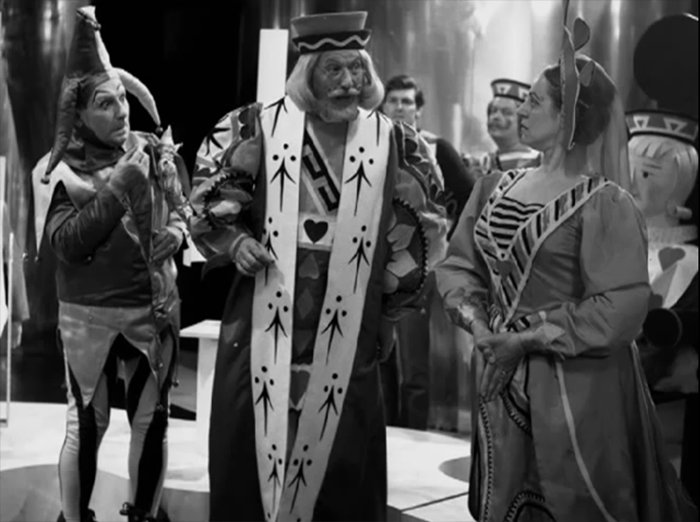

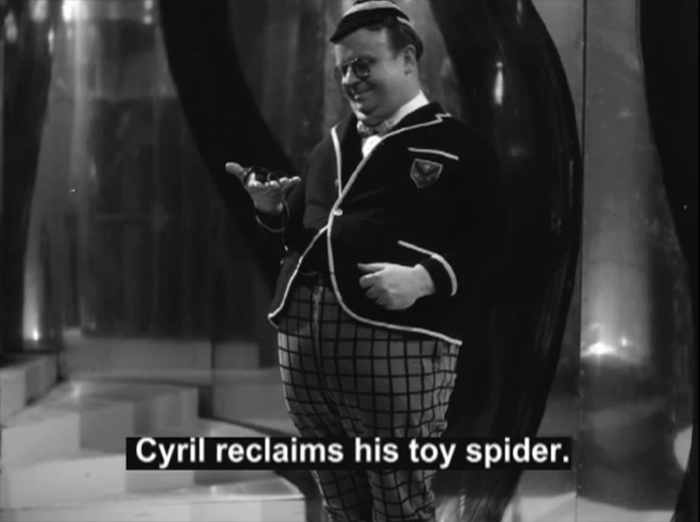

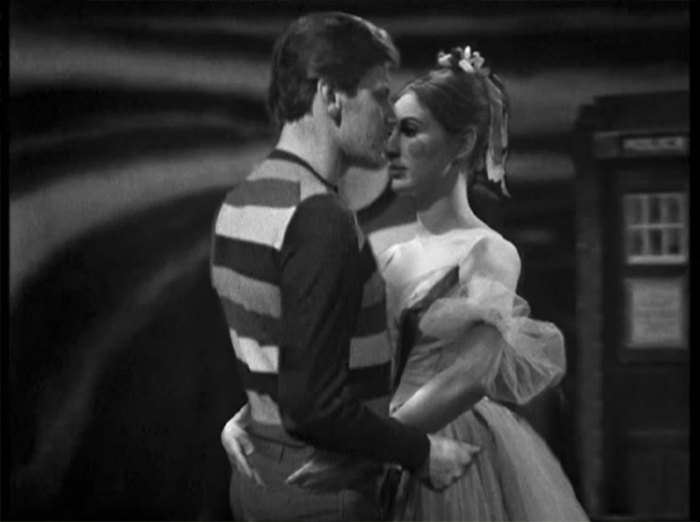

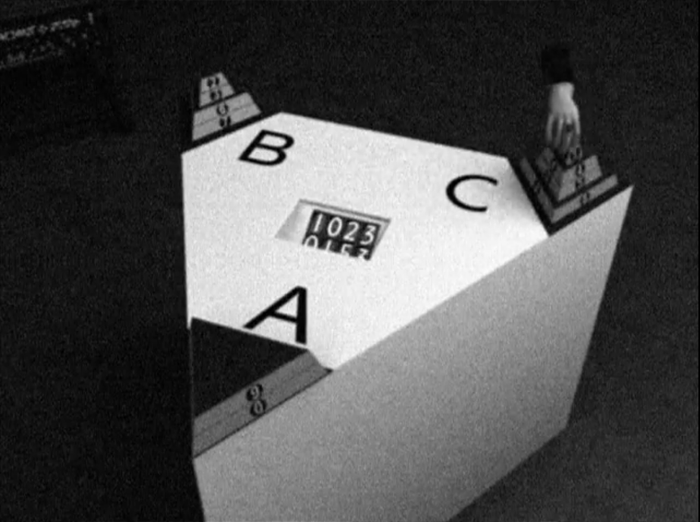

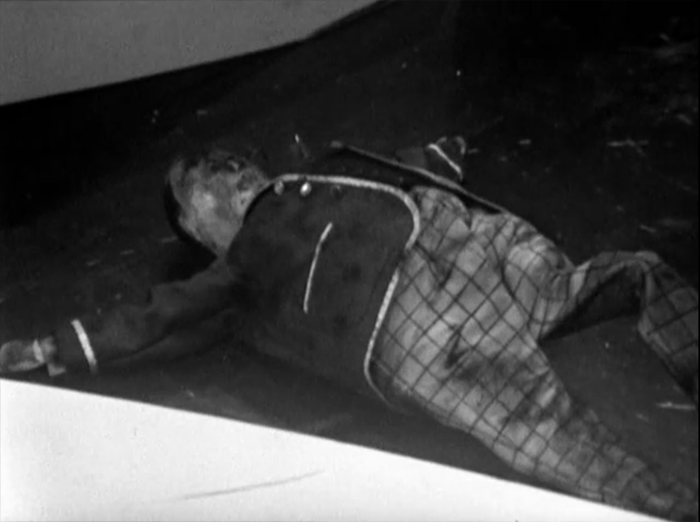

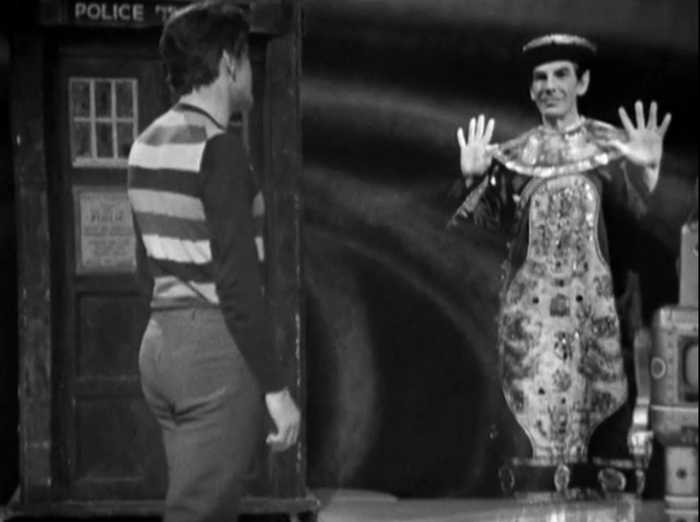

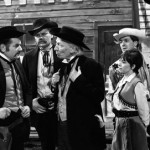
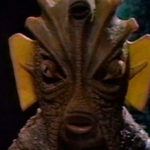








Probably my least favourite story of the whole Hartnell era. Actually of the whole 60’s era. I bloody hate this story.
It’s been long-held as a classic, probably due to the fact it’s mostly missing and the idea sounds cool enough. TARDIS invaded by a force that makes the Doctor and co. play nightmarish puzzles. Michael Gough, of Batman fame, as the villain. It all sounds great.
Instead what we get is the most tedious, uninteresting story of the Hartnell-era. The Doc can’t complete a simple puzzle for the duration of the story, a puzzle that children can solve at the age of 5! It just smacks of laziness on the part of the prop designers or writers. How hard is it just to give him some sort of futuristic chess board? We then have Dodo and Stephen play children’s games for 4 episodes, no really, that’s all they do. I can’t expect anyone to put any real effort into this story as there’s no deep substance to it. Hartnell is on holiday so he doesn’t care, Peter Purves and Jackie Lane have no reason to care as the script is so dire, even Peter Stephens, playing the fat Cyril, a guest actor who should give some energy into the proceedings, doesn’t care as he’s stuck in that god-awful costume. If nobody on the cast or crew cares, then how can I care?
This would have been the story that ‘regenerated’ Hartnell, and I’m so glad it isn’t because it would have been horrible to have this be one of the most significant episodes in the history of Who.
Like The Ark, this story also goes against the progressive ideals of Doctor Who. The Celestial Toymaker is an utterly racist caricature of an Asian man, played by a white actor. Even the name points this out, Celestial in the 60’s was an interchangeable term for Asian. So the villain is literally called ‘The Asian Toymaker’. Also, the infamous ‘Catch a Nigger by the toe’ rhyme which is used in a kids show. This is three years after Martin Luther King Jr.’s “I Have a Dream Speech”! I know people who lived through this as kids, and the rhyme they always used was ‘catch a tiger by the toe’. It’s just racism for racism’s sake, in a show which normally surpasses these backwards ideals.
If they ever find more missing Doctor Who episodes and this is among them, it’ll be a terrible shame when there are so many more deserving stories to survive.
The Celestial Toymaker gets a 0.3.
Like “The Massacre of St. Bartholomew’s Eve”, “The Celestial Toymaker” is the companions’ story more than it is the Doctor’s. The Doctor’s role is playing his own single game while his companions go through a series of tests to retrieve the TARDIS, offering what little help he can by giving warnings or stalling in his game. In fact, the Doctor spends most of the serial completely invisible and later silent. Something I’m sure you may already know or may have heard from jD, is that this was originally intended to be how they changed the Doctor, as after the Doctor reappeared he would be a completely different person. Thankfully they scrapped that idea and went with the eventual regeneration much later.
While the Doctor plays a board game, Steven & Dodo must pass through lethal versions of childrens’ games. With each episode having the duo play a different game, the story stays well paced, avoiding the slow pacing problems I associate with many old Doctor Who stories. Through the audiobook, I enjoyed listening to them work out how their opponents are cheating, braving the dangers when there’s no other choice and, when all else fails, getting by on pure luck. On the other hand, I can’t help but be annoyed at a certain degree of “genre blindness” in that the sight of a giant dance floor combined with a riddle containing the words “forever tap your feet” did not make them think that stepping on it would make them dance. I also can’t help but feel that Cyril’s defeat in TARDIS hopscotch was a deus ex machina to wrap things up and finish the story off quickly.
My first thought on seeing the Toymaker himself was that his design would NEVER be allowed today. No matter its intent at the time, it comes off as racist in today’s standards. The only thing potentially worse would’ve been either having an actual Chinese man in the costume or doing a David Carradine and having a white man posing as a Chinese man. Regardless, the Toymaker was an enjoyable enemy. Threatening but not truly malicious until he was about to lose. The enemies he sent after the companions were likewise distinctive. So much so I wonder if any of them were intended to be reminiscent of childrens’ characters from that era.
I think Dodo was better this story than before. Being able to actively contribute helps as she works with Steven on the Toymaker’s clues and showed she wasn’t afraid to take a risk in the name of making their way through. It will probably vary from person to person whether she gains or loses points for her attempts to play fair against unscrupulous opponents, and showing concern towards confirmed enemies like Cyril even though it does more harm than good. In general I also enjoyed how Steven and Dodo were largely able to succeed on their own and signs throughout the serial of the Doctor’s faith in their ability.
Looking back over the Hartnell stories I’ve watched so far (everything from about “The Dalek Invasion of Earth” forward and a few of the ones before), I think “The Celestial Toymaker” is my personal favorite. The only one that may beat it out is “The Daleks’ Master Plan”, mostly because I’m a sucker for storylines of that scale. With that in mind I’m giving Toymaker the same rating of 4.6 out of 5.
I wanted to like this story. I soooooooooo wanted to like this story. Then I watched it (loose canon recon). I’ve watched it twice since then and I still WANT to like it. But its meaningless fluff that wastes a potentially great baddie, has puzzles with no logic, games that aren’t games and a Dr who that for the most part is missing Dr who. It took me three watches now and it only is lust dawning on me that the toymaker commanding moves is controlling the board itself, not making the Dr move faster.
The “race against time is like watching a slug on the back of the turtle, when we should be watching the rabbit. How can you have a race when no one wants to win?
The sets are drab, the dialog is sometimes incomprehensible, the characters 1 dimensional, and the pace is sloooow. I blame the writing and directing for this one.
If they ever recover footage I’ll watch again just out of curiosity, but otherwise I can honestly say this is the only Dr who episode that I don’t really care if i never see it again.
0.6
The TARDIS is trapped by the Celestial Toymaker in a land where nothing is as it seems, and everything is designed to alleviate an infinite boredom. The Doctor is rendered invisible and forced to play a logic game, while Steven and Dodo are treated to a lethal version of The Crystal Maze, as they manoeuvre a series of strange games in an attempt to return to the TARDIS.
Meeting an array of even stranger characters – clowns, dolls, playing cards and toy soldiers – Steven and Dodo must avoid endlessly bizzarre booby traps such as electrocuted floors, music to which you are compelled to dance inanely; chairs that eat you alive, and a suspiciously large pie.
THE MAJESTY
The idea of this film is great: pure fantasy. An immortal guardian who staves off his boredom with childish amusements is a fantastic villain – his amorality somehow more believable than if he had been a manifestation of pure evil. Michael Gough is the perfect actor for this character, making him one of Hartnell’s most memorable enemies.
There is also something good about how ridiculous the games are – hopscotch, obstacle courses, hunt the thimble, odd one out. There’s few more humiliating ways to die than while losing at an infantile game, and Steven in particular lets his frustration come out.
The character of Cyril is pretty good as well. Perfectly obnoxious, he is the first opponent we can really dislike, which gives us so much more motivation to root for Steven and Dodo.
THE MISERY
The structure of the story, with the Doctor invisible and rendered mute, and with Steven and Dodo facing a new opponent with every game, means there’s little development or progression in the story. It could have been two episodes or ten – it would make no difference, because the story simply repeated the format over and over with a new game every episode.
The games themselves were often frankly boring, and each one was spun out to last a full episode, even when it could have been completed in ten minutes. There was little tension and lots of padding.
Each episode ends on a riddle, no doubt intended to entice viewers to try to work out what was coming next. But the riddles are totally unsolvable – they are all simply red herrings and therefore a missed opportunity to increase interaction with the audience.
The Doctor’s trilogic game is referred to as being something highly technical, but it really isn’t. I played a version of this game in primary school, and while there are more pieces in the Doctor’s version, the basic algorithm to solve the game is not in any way different – it just has to be repeated more times. Why didn’t the Toymaker challenge him to a game of four-dimensional chess or something?
MAGICAL MOMENTS
– The Toymaker leaves the Doctor with one disembodied hand. It’s a cool idea. Mind you, it doesn’t look good on the reconstruction, but it’s still sort of shocking when it happens.
– On the other hand, the CGI dancing dolls in my reconstruction are both freaky and comical, like zombies at a 90s disco.
– After all the childish ‘fun and games’ where Cyril tricks Stephen and Dodo, cheating and generally playing dirty, he slips onto the floor and is instantly electrocuted. We then get a long lingering shot of his black and smoking corpse. I can just imagine the screams of traumatised young kids who thought that Dr Who was getting down to their CBeebies level. How wrong they were!
– The Toymaker’s final trap. “Make your last move, Doctor. Your last move…..”
REPRESENTATION
Nothing in the script suggests that the Toymaker is supposed to be Chinese. At least, not that I remember. And given that he is supposed to be an alien and an immortal, there’s no obvious link to China. Yet here we have a European actor dressed in clearly Chinese-inspired clothes, and the Doctor putting on a high-pitched caricature of a Chinese accent when mimicking the Toymaker’s voice. It seems as though one of the creatives – probably the Director – saw the term ‘Celestial Toymaker’, and decided that as “Celestial” was an unflattering nickname for a Chinese person in 60s London, it would be a hilarious in-joke to make the Toymaker oriental. The joke doesn’t feel quite so hilarious today, and while the Toymaker’s garb is certainly iconic, and while Michael Gough certainly does a grand performance with no hint of Chinese caricaturing, the story can’t help avoid a lingering smell of racism. It’s strange to have this coming on the back of “The Ark”, with it’s more serious moral that people of all shapes, colours and sizes must work together. It seems that the producers can be progressive one week, and make a racist joke the next, without ever seeing the inconsistency.
IN SUMMARY
The Celestial Toymaker was one of my favourite William Hartnell adventures as a child. As an adult, my opinion has changed a lot. Even discounting it’s demeaning representation of Chinese culture, it is repetitive, absurd and, worst of all, boring. Michael Gough cannot rescue it. The Doctor is written out of the story. Dodo is no less annoying than usual. Steven just wanders about doing his thing, and everyone else pops up for one annoying scene or other and then disappears. I like that Dr Who is entering, quite literally, the realms of fantasy, but this was quite a mis-step for the first such adventure.
OVERALL: 1.9
This serial is dreadful. I’ll start with the positives, because there aren’t many of them. Despite the archaic racism of his character, the Celestial Toymaker is a fairly average antagonist that doesn’t detract very much from the narrative. The concept of a world he creates just to amuse himself is an interesting idea that had a lot of potential. The idea of dolls coming to life is also fantastic, and I wish the dolls weren’t consistently irritating enough to destroy their efficacy. Lastly, Mrs. Wiggs and Sgt. Rugg were an oasis of mediocrity in a desert of boredom and missed opportunity.
Though there are a lot of elements to choose from, I think the worst part of The Celestial Toymaker is its structure. Just think about what happens in each episode. In Part 1, Steven and Dodo play a game against some clowns and win, reaching a fake TARDIS. In Part 2, Steven and Dodo play a game against some playing cards and win, reaching a fake TARDIS. In Part 3, Steven and Dodo play a game against Mrs. Wiggs and Sgt. Rugg and win, reaching a fake TARDIS. In Part 4, Steven and Dodo play a game against Cyril and win, reaching the real TARDIS—with a bit of resolution tacked onto the end. The serial is way too structurally repetitive, and it would have taken much more than the capabilities of these writers for it to be something remotely compelling.
The pacing is almost as bad as the structure, turning a repetitive narrative into a slow, repetitive narrative. After we are introduced to the premise of the serial in Part 1, there is not a single plot device that doesn’t overstay its welcome. Even the scene with Wiggs and Rugg, which I argue is not altogether as useless as everything else, is decidedly boring by the 7-minute mark. If the structure is as tedious as a daily commute, the pacing adds some rush hour traffic to the drive.
And I can’t wrap up my critique without bringing up the infantilization of Steven and Dodo. With the way that they are characterized in this serial, if someone suggested that the sky was lime green, they would believe it. Dodo was the most credulous, gullible, unintelligent version of herself, and that is really saying something. This is the belligerently stupid Dodo that I remembered at the introduction of her character, the Dodo that I cannot wait to leave the show in a couple of serials. And though Dodo is overwhelmingly bad, I don’t want to give the impression that Steven is much better. Dodo sets a very low bar, and although Steven clears it, he is still much worse than any version of Steven that we have encountered thus far. In my ranking of 1st Doctor companions, this performance has made me place Steven firmly below Vicki, and I didn’t think Vicki was anything to write home about.
0.1/10
Let’s start with the obvious. 29 musical interludes. I’ve been working my way through this serial for the last five days, and there is not a moment that The Ballad of the Last Chance Saloon was not stuck in my head. It’s catchy; I’ll give it that. But at its best, it functions as a brief respite, postponing the next scene just enough to give the viewer a chance to breathe. At its worst—which is most of the time—it is a relentless, simplistic tune that needlessly recaps plot points and sometimes even spoils what is to come. If everything else about this serial were perfect, the interludes alone would make it impossible for me to rate this serial above a 3.5. And the rest of The Gunfighters is far from perfect.
With that being said, it’s not bad. When the writers really lean into satire, the story works well—this is most evident in the opening episode, which has a lighthearted tone and continual nods to comedy which make it a delight to watch. However, these satirical elements lessen over time until the intent of the writers becomes muddled and ineffective. Part 4 is where the serial really begins to fall apart, when the interludes are at their peak annoyance and the serious elements of the narrative start to feel nonsensical. The gunfight at the OK Corral is the weakest moment of the serial, which is a problem for what should be a narrative climax.
The protagonists are all strangely powerless, with the Doctor, Steven, and Dodo all spending a significant amount of time under the direct control of one entity or another. However, this never seems to hinder the progression of the story. Wyatt Earp, Bat Masterson, and Doc Holliday are all acted and written well enough to carry the plot when they are required to, and the protagonists’ secondary roles allow them to react to the idiosyncrasies of the Wild West without that becoming the focal point of the serial. The conflict between lawman and outlaw is interesting enough, and I do like the contrast between Wyatt Earp, a man pushed to the brink, and Bat Masterson, a man who upholds the law in all cases. I never did get quite so far as to like Holliday, but if I were held at gunpoint, I’d say I enjoyed him a bit more than I found him to be a loathsome sonofabitch.
The antagonists are mediocre at best. For a patriarch, Pa Clanton is far too much of a nonentity, and his sons are forgettable characters with regrettable accents. Johnny Ringo was a joke with the worst accent of the bunch, but at least for my sanity he takes care of Charlie. I’ve never been so relieved to see a character die as I was when that weak-jawed, sniveling wretch of a bartender bites the dust. Lastly, Kate is a sexist caricature, but she’s rarely annoying, and her interactions with Dodo are quite charming at times.
2.2/5